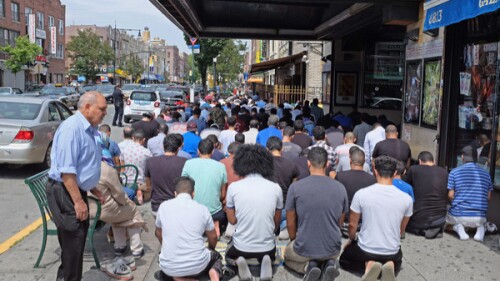Oberlin College professor Mohammad Jafar Mahallati says he’s devoted to creating a peaceful world and forging a greater understanding between Muslims and Christians.
But activists slam the so-called “Professor of Peace” and former diplomat for allegedly helping the Iranian government cover up the massacre of thousands of jailed political opponents in 1988, allegedly ordered by then-leader Ayatollah Ruhollah Khomeini.
Relatives of the dead dissidents are demanding that Oberlin, a liberal arts college 30 miles southwest of Cleveland, fire Mahallati, 70, a professor of religion and a Presidential Scholar in Islamic studies who also has taught at Columbia, Georgetown and Princeton.
“We believe ... that his [Mahallati’s] role was to obfuscate and lie to the international community about mass crimes perpetrated by the Iranian regime,” said a group that reps 600 victims in a letter to Oberlin president Carmen Twillie Ambar in 2020 — part of a two-year campaign to oust the prof, who has worked at the college since 2007.
Between 5,000 and 30,000 opponents of the regime were slaughtered during the summer of 1988, then buried in mass graves at secret locations, according to human rights groups.
Critics charge that Mahallati aided the Khomeni government by denying the executions, which Amnesty International said were part of “ongoing crimes against humanity.” The group demanded a formal UN investigation in 2018, and also issued dozens of urgent appeals in the days after the massacre.
Representatives of 50 international UN-affiliated nonprofits have also demanded that the school conduct “an immediate and impartial investigation into [Mahallati’s] continued employment.”
Mahallati, who served as Iran’s ambassador and permanent representative to the United Nations from 1987 to 1989, was among a list of Iranian officials who said the killings never happened, Amnesty said.
In 1988, in a statement to the UN, he said reports of the mass murders were “misinformation” and a year later called them “political propaganda against the Islamic Republic.”
Victim Bijan Bazargan, a 28-year-old leftist dissident serving a 10-year-sentence, was condemned without a trial or any chance to defend himself, his sister, Lawdan Bazargan, told The Post. His family was sent only a duffel bag with a wristwatch, shirt and a death certificate, according to the New York Times.
“When my father asked the prison officials to give him Bijan’s body, they said, ‘He was an apostate and has no place in this world,’” said Bazargan in an interview from Sweden.
She’s there attending the trial of Hamid Nouri, a 61-year-old former Iranian prison official accused of war crimes and crimes against humanity for his alleged role in the 1988 executions. Swedish authorities arrested Nouri in 2019 while he was visiting relatives.
Bazargan’s twin sister, Laleh, who lives in Sweden, has testified in the trial, she said. A verdict is expected shortly.
“I am envious of my twin sister that the country she lives in arrests and puts on trial a criminal such as Nouri, but the United States rewards people such as Mahallati by giving them teaching positions to brainwash young minds,” Bazargan said.
Mahallati has denied what he called “unfounded accusations” against him, and issued a formal statement that Oberlin College posted on its website last year.
“The official positions I formally took at the United Nations during the time I served do not portray my personal views,” the Oct. 28, 2021, statement reads.
“My personal views are well portrayed in all my published books, articles, and teachings during the last 30 years since I left the U.N. post. It is important to note that my accusers have not found a single statement from me that is remotely consistent with their unfounded accusations.”
A statement from his lawyer, who is not identified, is also on the Oberlin website, saying, “Professor Mahallati, who was in New York, had no knowledge in real time about the covert executions nor did he attempt to conceal the facts once they were revealed.”
Oberlin officials said they conducted an internal investigation and are satisfied that Mahallati did nothing wrong.
“After consulting a number of sources, and evaluating the public record, the College could find no evidence to corroborate the allegations against Professor Mahallati, including that he had specific knowledge of the murders taking place in Iran,” Oberlin’s statement reads.
Since coming to Oberlin in 2007, “Professor Mahallati has developed a reputation as a scholar and a teacher for espousing religious tolerance and seeking peace and understanding between all people.”
Mahallati also supported the Palestinian intifada of 1989 and publicly backed his government after Iran issued a fatwa for the death of British novelist Salman Rushdie following the publication of his 1988 book “The Satanic Verses.”
Rushdie remained in hiding for nine years as ultra-conservative clerics and state media outlets in Iran raised the bounty on him to $4 million.




